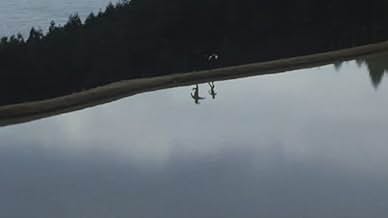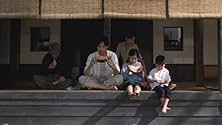IMDb रेटिंग
7.5/10
8 हज़ार
आपकी रेटिंग
एक युवा महिला का पति स्पष्ट रूप से बिना किसी चेतावनी या कारण के आत्महत्या कर लेता है और अपने पीछे अपनी पत्नी और शिशु को छोड़ जाता है.एक युवा महिला का पति स्पष्ट रूप से बिना किसी चेतावनी या कारण के आत्महत्या कर लेता है और अपने पीछे अपनी पत्नी और शिशु को छोड़ जाता है.एक युवा महिला का पति स्पष्ट रूप से बिना किसी चेतावनी या कारण के आत्महत्या कर लेता है और अपने पीछे अपनी पत्नी और शिशु को छोड़ जाता है.
- निर्देशक
- लेखक
- स्टार
- पुरस्कार
- 9 जीत और कुल 1 नामांकन
फ़ीचर्ड समीक्षाएं
And beautiful and fascinating film with a gentle lyric quality. Runs directly counter to the usual Hollywood expectations. The most emotionally packed scene is filmed in extreme longshot! You can't even see the faces of the actors but the location and the action that you can see are enough. If you want to see a standard hollywood formula, then stay away. If you like quiet and moving films shot in entirely new ways (granted the director owes much to Ozu) then get this film.
Rarely do I rate films so highly, but Maborosi earned it's nine. A large part of my enjoyment of the film was due to the beautiful and subtle directing that seemed to compliment the story itself perfectly. Koreeda is a very promising Japanese director. I recommend this one to all serious movie watchers, and I await his future films.
With a cinematic eye that harks back to Kurosawa and the first color features of Antonioni (esp. Red Desert & Blowup), Maborosi is one of the quietest and most delicate little films you will ever see. It is the absolute antidote to fare like Die Hard.
A slow paced film that lets you have some empathy for a life changed by inexplicable loss, diverted to unexpected place and contemplation. Despite the intensity possible in the theme, the behavior is a compelling mixture of detachment and continuation of everyday activity, while underneath you can see the memories are unresolved. Some nice acting, especially if you can attune yourself to subtleties of normal life and are not expecting "larger than life" displays. The photography is beautiful and alternates with the acting in setting the mood and being the focus of attention.
I watched the US DVD version, which has somewhat disappointing video quality. You can see the director took some spectacular imagery which I have got to hope came out better on film, because on the DVD the resolution is muddy at times and some of the color is flat. It is just a bit better than VHS. A real pity they could not make a better digital transfer of such a visual artwork. Most of the soundtrack is voices and background environment which fits perfectly with the film, there is one sequence with (very effective) music soundtrack.
I watched the US DVD version, which has somewhat disappointing video quality. You can see the director took some spectacular imagery which I have got to hope came out better on film, because on the DVD the resolution is muddy at times and some of the color is flat. It is just a bit better than VHS. A real pity they could not make a better digital transfer of such a visual artwork. Most of the soundtrack is voices and background environment which fits perfectly with the film, there is one sequence with (very effective) music soundtrack.
In 1998 the Japanese director Hirokazu Koreeda astonished those of us who feel passionately about the expressive power of cinema with "After Life" a film about the hereafter that I would claim to be one of the masterworks of the past decade. The effect of this was so mesmerising that for some time I completely forgot about "Maborosi" an earlier work that I had caught up with only a few days before. Although not in the same league, it is worth a look if only to trace the origins of the later piece. Just as "After Life is a meditation on life from the point of view of the dead, "Maborosi" reverses the process and meditates on death from the living's perspective. A young girl feels somehow responsible for the death of her grandmother whom she cannot persuade to return to the family home after she wanders off one day. As a young woman she again is unable to escape a feeling of guilt when her husband is unaccountably struck down and killed by a train. These events happen fairly quickly in the first third of the film. The rest is an elegiac account of her second marriage to a widower with a young daughter and their life together in a remote fishing community as far away from the cramped streets of the city as it is possible to imagine. With the baby son by her first husband now grown to a small boy the new family feels complete. And yet the woman still exists in a state of unease. Although there are no more disasters, there are continual reminders of the frailty of life. An elderly woman, not unlike her grandmother, takes a boat out in a storm but returns unharmed. On a later occasion she watches an anonymous funeral procession which seems held in longshot for an eternity. "Marobosi" which means "The Beckoning Light" - a clear reference to death - is full of the influences of other directors. There is that of Ozu in the many domestic interiors where the camera seldom moves, Angelopoulos in the many long held exterior vistas and even Hou Xiaoxian in the way the audience is made to concentrate hard to work out character reactions and situations given a minimum of verbal and visual information. One curious fact about the film is the way the characters either appear in shadow or middle distance so that their emotions are hard to recognise. In the end this effect of deliberately distancing the protagonists is the film's essential weakness. It gives a sense of detachment and uninvolvement that Koreeda was to overcome triumphantly in the marvellous "After Life".
क्या आपको पता है
- ट्रिवियाHirokazu Koreeda's directorial film debut.
टॉप पसंद
रेटिंग देने के लिए साइन-इन करें और वैयक्तिकृत सुझावों के लिए वॉचलिस्ट करें
- How long is Maborosi?Alexa द्वारा संचालित
विवरण
बॉक्स ऑफ़िस
- दुनिया भर में सकल
- $1,44,025
इस पेज में योगदान दें
किसी बदलाव का सुझाव दें या अनुपलब्ध कॉन्टेंट जोड़ें























